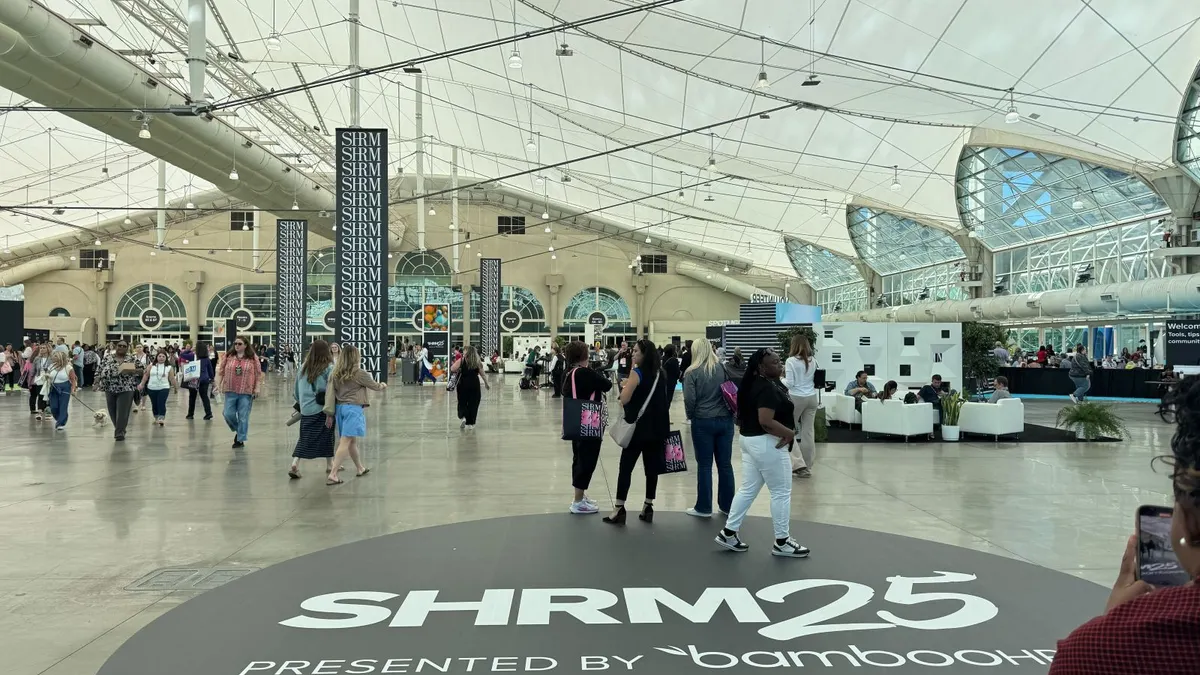Editor's note: Welcome to Resource Actions, our occasional, back-and-forth column covering everything from the bizarre to the day-to-day that, despite everything, impacts HR departments. Please feel free to send all tips, thoughts and generation-based complaints to [email protected] and [email protected].
This story is part of a series on the multigenerational workforce. The full package is available here.
Kathryn Moody: As a millennial, I have to say ... the talk about generations can get real tiring, real quick.
Remember that avocado toast freak-out on the internet when one real estate expert said that the supposed brunch staple is the reason why millennials aren’t buying houses? You still see pockets of the internet that take millennials as seriously as they’d take their elementary school kid’s commentary on the latest trade deliberations between the U.S. and China.
Just so this doesn’t look like us millennials whining about whatever was written on the internet today (another stereotype, thanks), we invited our managing editor, Liza Casabona (a proud Generation Xer), to weigh in on this week’s installment.
Liza Casabona: For the record: I think avocado toast is delicious. And plenty of urban dwellers I know of multiple generations have delayed buying houses.
But all of this shows why the generation stereotypes are problematic. And I’m not just saying that because Gen X is sometimes dubbed the “forgotten middle children” of the generations, sandwiched between two larger groups.
We’ve been fighting against our “slacker” stereotype since Millennials were called Gen Y. It’s all bunk.
Kathryn Moody: At least Gen X didn’t have to google memes about themselves. Check this out:
We’re even killing lunch! Sad.
But it’s true that these problematic elements impact all the generations, especially if we bring these stereotypes to the workplace.
Liza Casabona: Fair. My search results for Gen X seem to indicate we ... don’t sleep enough?
And boomers aren’t faring much better than millennials if Google searches are any indication.
What are the impacts of those stereotypes?
Kathryn Moody: Millennials shocked HR at first, I think, because we didn’t buy into the systems off of which the workplace had functioned for decades. We’re blamed for the push toward more flexible work, improved user experience on employee technologies and prettier offices. But you’ll note that these were all aspects of the workplace that were ready to be changed or replaced, anyway.
Employers were forced to re-examine their functions, and for a lot of them, it was for the better.
Liza Casabona: If we listen too much to stereotypes, it’s limiting. If that gets in the way of actually listening to the human standing in front of you, that’s not great. And for HR it can also be dangerous — this is the stuff of age discrimination suits.
Kathryn Moody: Interestingly, you can slowly watch stereotypes all come full-circle from demeaning to "this generation is the best, and you should obviously hire them because of the time in which they were born." There are some insidious reasons behind this, as you noted — including the fact that younger employees are generally cheaper. Millennials aren’t the only generation that seeks innovation, obviously. We’re just the easiest to hire at lower rates.
Liza Casabona: I’ve never loved the antagonistic setup that seems to permeate most of these conversations. Stereotypes are a huge part of perpetuating that. Headlines about one generation holding back or disrespecting another always make me cringe. You can’t ignore the reality that people are staying in the workforce longer, that organizational dynamics are fundamentally changing and that HR is going to have to face those realities, all day every day. But to tie those changes simply to generational differences is too narrow; there’s a slew of economic and cultural forces at work here.
What about people management?
Kathryn Moody: It goes back to inclusion, generally, which is where I think this gets touchy and where some of these stereotypes are born. If thinking empathetically, I can see how workers who have put up with perhaps legitimately poor working conditions for years may feel even a little bitter that things seem to be changing because their kids “complained” or need to be “coddled.” That language doesn’t come out of nowhere.
But even that is based on an assumption.
Liza Casabona: I’m not sure I agree that there’s bitterness about a change in working conditions. Honestly, I’m not sure every workplace has fundamentally changed as much as generational theories tell us they have (with the exception of some transformations around portability, gig work, tech advancements, etc.) But I do see some legit issues around, for example, communication.
Natural communication channels for different generations are not always the same. People can adapt, but some of the stereotypes (and complaints) generations hold onto about each other do come down to critical communication challenges. Does a Gen Z or millennial employee expect everything to happen over chat or text? Maybe. Does a boomer or Gen X worker think their millennial manager isn’t communicating with them in person enough? Possibly. Surveys certainly seem to support this.
Kathryn Moody: There may be a legitimate tech gap here. Millennials quite literally grew up with AIM, which led into texting and later on the myriad of messenger apps we have available today. For me, it’s natural to use HipChat at work to talk about work and to chat with work friends. I can see why that wouldn’t be the case for employees that saw a different workplace in their 20s, though. The practice is quite literally changing people’s workflows.
Liza Casabona: The change is definitely real, but I didn’t grow up with AIM and I 100% see the benefits of the chat platforms for a workforce that is scattered over multiple locations or involves remote work. It makes my job as a manager easier. But that probably further shows you can’t make assumptions about large groups. Communication norms need to be discussed and agreed on for any team, regardless of whether it’s multigenerational.
Kathryn Moody: A lot of this is common sense, too. Respect people’s preferences, but ensure all employees are aware (even during the interviewing process) that your organization prefers to handle all important communication through email, for example. An employer can set the ground rules. The key is making sure everyone is aware of and on board with those rules from the get-go, and that any accessibility issues are handled respectfully.
Liza Casabona: Yes! Diversity of perspective is always beneficial for an organization, regardless of whether that is based on age, experience, gender, race or anything else. Having a workplace that is all the same puts an organization at a disadvantage in a world that is anything but homogenous. Businesses are more resilient and better able to adapt when they reflect diversity in their ranks.
Do generations matter?
Kathryn Moody: Honestly, employers should be empathetic to people of all backgrounds, ages and experiences. Generation certainly plays into this, but an employer shouldn’t assume that an employee will prefer a workflow simply because they are 25 or 50. Most people would probably like to have work/life balance, for example, but that is going to look differently for everyone, even millennial to millennial.
Liza Casabona: That’s true. Obviously employers can’t ignore the fact that there are different generations, but shouldn’t it be less about what an entire generation wants/needs and more about what the individual employee does? It’s management 101, no two employees are exactly the same — regardless of the year they were born.























